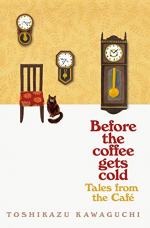
|
| Name: _________________________ | Period: ___________________ |
This test consists of 5 short answer questions, 10 short essay questions, and 1 (of 3) essay topics.
Short Answer Questions
1. What sound does the story end with?
2. In Maeterlinck's The Blue Bird, where do Tyltyl and Mytyl encounter the child with the terrible fate?
3. Who enters the café just after Kurata finally finishes his coffee and disappears?
4. Just before he lifts his coffee to drink it and return to his own time, what does Kurata hand to Miki?
5. Why is Kiyoshi initially unsure whether he will be welcomed into the café?
Short Essay Questions
1. What lies does Yukio tell his mother about taking care of himself, and why does he tell these lies?
2. How do Yukio's actions and emotions during the scene where he first sits down in the time-travel chair foreshadow his plan to not return to the present?
3. After Asami suffered a miscarriage, what advice did Kurata give her?
4. What does Kinuyo explain to Yukio about the silver stirrer, and what does he realize this means Kinuyo knows?
5. What is Fumiko's relationship to the café?
6. What is Kurata wearing in the story's opening, and why does it make him seem out of place?
7. How did Kinuyo prove her devotion to her son over and over during his childhood?
8. What news about Yukio does the reader learn in "Lovers"?
9. What are the conditions that Kurata gives Fumiko for either bringing or not bringing Asami to the café?
10. What happened when Kimiko tried to intervene in the mugging incident?
Essay Topics
Write an essay for ONE of the following topics:
Essay Topic 1
Now that you have read Kawaguchi's complete collection, what moves do you see him making as an author to convince the reader to accept time-travel within his narrative? Does he take a more magical or scientific approach, or is it a blend of both? How do the café's "rules" for time-travel fit into this? How do details like descriptions of the café itself, the coffee ceremony, and the time-travelers' perceptions during the experience support your interpretation? Write an essay in which you analyze Kawaguchi's approach to time-travel and evaluate its impact on the reader. Support your assertions with evidence drawn from throughout the text, and be sure to cite any quoted evidence in MLA format.
Essay Topic 2
Miki is portrayed as an eccentric child who is happiest when she is singing loudly, showing off her new backpack, pretending to be French, or mischievously criticizing her father or trying to persuade him to allow her to pour the coffee. How does this characterization relate to the "collectivistic" and "shame" aspects of Japanese culture? Would Miki's eccentricities be depicted as charming in an older character? Write an essay contextualizing the characterization of Miki within the collection's depictions of what honor, pride, and shame look like for older characters. Support your assertions with evidence drawn from throughout the text, and be sure to cite outside sources and any quoted evidence in MLA format.
Essay Topic 3
How does the text's advice about dealing with regret differ from its advice about dealing with grief? What similarities are there between these two emotions, and what is the key difference between them that leads to the text advocating different ways of dealing with them? Write an essay in which you explore the text's position on the sources and impact of these two emotions as well as its differing advice for dealing with them. Use the examples of the time-travelers in the collection to support your assertions. Be sure to cite any quoted evidence in MLA format.
|
This section contains 1,189 words (approx. 4 pages at 300 words per page) |

|




